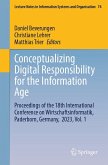The significantly expanded and revised contributions in this volume provide a comprehensive overview of the transformative potential of technology and shed light on the symbiosis between innovative technologies and organizational processes. The volume highlights topics such as digital transformation and the integration of cutting-edge technologies and emphasizes the crucial role of information systems in digital transformation.
The book offers valuable insights for researchers, practitioners and students who seek to understand and shape the future of information systems development in our rapidly evolving digital landscape.
Dieser Download kann aus rechtlichen Gründen nur mit Rechnungsadresse in A, B, BG, CY, CZ, D, DK, EW, E, FIN, F, GR, HR, H, IRL, I, LT, L, LR, M, NL, PL, P, R, S, SLO, SK ausgeliefert werden.









